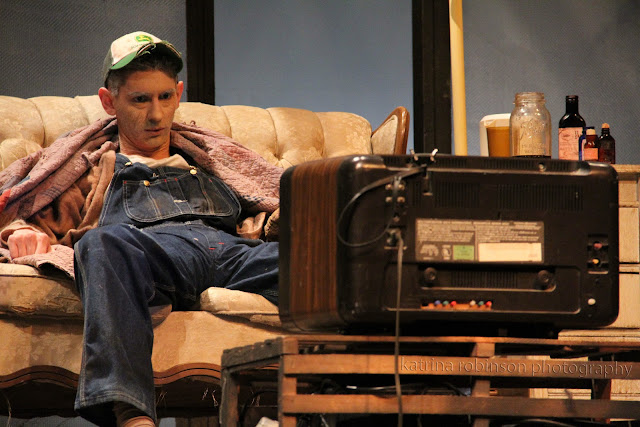 |
| Isaac Wood as Dodge in "Buried Child" |
review by Janet I. Martineau
Macabre, the definition of: “gruesome, ghastly, grim; suggesting the horror of death and decay.”
Yep, that sums up Sam Shepard’s play “Buried Child,” playing through Sunday at Saginaw Valley State University in its year of presenting classics that are, well, chilling views of dysfunctional American families.
To talk much about its storyline is not a good idea since all is revealed slowly. Suffice it to say it takes place on an Illinois farm, 1977, with a cast of characters that includes a dying and depressed dad, a chattering mom who one quickly wishes would SHUT UP, and two adult sons with issues.
Something horrible happened several years ago that has rendered this family totally dysfunctional -- a couple of things actually -- and we will spend two fascinating and intriguing hours learning what. And there actually some laughs along the way too.
‘Nuf said -- other than to further say Shepard’s subtext is a look at the decay/death of the American dream (things were grim economically in the 1970s and societal norms also were in transition). Or more precisely, it challenges the American myth about family perhaps,
“Buried Child” will not be everyone’s cup of tea, despite the act it won a Pulitzer Prize. But how lucky we are to live in a area where edgy theater is an option.
And what it serves up is a dynamic performance by Isaac Wood as Dodge -- the family patriarch who is couch-bound most of the play, drinking booze from a bottle hiden under the cushions and hacking with a death-rattle cough. Old codger Dodge is at once charming and loathsome.
Dodge is around 70; in horrible health. Wood is a college freshman and presumably healthy. Director David Rzeszutek has chosen to minimally age Wood with makeup. Instead, every fiber of his being is an old man in decay -- yet, with a voice that projects and enunciates the clearest of the cast. He is so feeble we expect him to die any minute. It is an astounding performance.
Dakotah Myers is a son-come-home, around age 40. Myers’ performance as Tilden also is stellar -- a zombie-like man-child who walks haltingly, speaks in sentences containing only three or four words, given to hauling in corn and carrots he says he harvested in a garden that does not exist. What the heck happened to him, since there are references he was not always this way.
Mykaela Hopps is the family matriarch Halie, around age 60. She yells most of her lines from upstairs, barely seen; leaves early in the first act and then does not return until right at the end. Good thing. She is a first class bully/bitch -- and Hopps plays her very very well. Too well. I could feel my blood pressure rising,
And by play’s end, our opinion of all three will shift!
Jordan Stafford is cast as Tilden’s son Vince, Lexee Longwell as Vince’s girlfriend Shelly, Keith Schnabel as the couple second weirdo son, and Blake Mazur in a tiny tiny role as a soiled man of the cloth.
They are incidental characters really. Stafford at dress rehearsal was not yet settled into his role. Schnabel needs to work on his enunciation (he was better in the second act). And Longwell, the only sane person in the storyline, needs to stretch just a bit more in her reactions. Mazuer’s role is but a flash.
The Jerry Dennis set is jarring -- the edge of the walls jagged and looking like they have been burned, with visible (and symbolic; lots of symbolism in thos show) rain falling the entire first act (along with thunder via the sound crew). The interior of the home has definitely seen better days, along with the ill-garbed family.
And the intermission music is just plain creepy.
Director Rzeszutek, his crew and most of the cast create an atmosphere that chills the bones like that rain. Shepard’s story slowly evolves -- and sadly, by today’s world, is not all that horrific given recent headline. But at the end we realize how a chain of events from within and outside of a family can turn the American dream into a nightmare.
Director Rzeszutek, his crew and most of the cast create an atmosphere that chills the bones like that rain. Shepard’s story slowly evolves -- and sadly, by today’s world, is not all that horrific given recent headline. But at the end we realize how a chain of events from within and outside of a family can turn the American dream into a nightmare.
Loved the open-ended ending too. Can put our own spin on it...is is real or surreal, real or symbolic, and if real what happens next.
No comments:
Post a Comment